
I really never considered the spiritual side of life until I was 22 years old. I was meeting consistently with a counselor who started to convince me slowly over many months that there is more to life than just logic, reasoning, science, and intellect. I started to agree that intuition and self-reflection could have value, too. I read books on spirituality and became interested in mystical matters. I found it very exciting, but unfortunately I was not sober. My obsession with lust was actually getting worse, and my dabbling in spiritual things was not helping things.
A friend introduced me to Twelve-Step recovery, but I didn’t consistently surrender. I was still caught up in the idolatry of lust. My behavior indicated that women were my higher power. After a particularly dark bottom, I decided to surrender to the process of Twelve-Step recovery. My conception of God was limited at first. I often thought of any Higher Power as harsh, unforgiving, and seemingly random.
That started to change with time in recovery and the influence of SA. I started to think of God as loving me personally. I began to think that He is guiding everything that happens to me. I remained sober for three and a half years and sponsored other addicts. Things looked a little bit okay, but then my life really fell apart. Ultimately, I lost my sobriety and sank to a dark place.
Looking back, I was relying too much on specific individuals and not enough on my Higher Power. I looked to other people to carry me through. After losing my sobriety, I’m sad to say I lost some faith in Higher Power and in SA as a whole. I tried even harder to be fixed by other human beings. I didn’t get much sobriety for a long stretch.
Recently I reached seven months of sobriety again. I’m attempting to rely on my Higher Power through a vigorous effort to work the principles of the Program. Most important is to realize that I’m powerless over lust—that my life has become unmanageable. I cannot deal with my lust problem on my own! That’s the problem. But what’s the solution?
The Big Book says, “…that’s exactly what this book is about. Its main object is to enable you to find a Power greater than yourself which will solve your problem” (AA, 45). So the problem is my attitude toward lust, and the solution is God. But finding God is not easy. I must start by believing that God will restore me to sanity (Step Two), and then making a decision to turn my will and my life over to God’s care (Step Three).
A member of the Fellowship whom I respect asks rhetorically, “Why would I turn my life over to God’s care if God is not trustworthy?” Clearly, my conception of God must include that He is trustworthy. The Big Book makes clear declarations about the nature of God and His characteristics in the Step Three section of chapter five, “How It Works.” It tells us that God is the Principal and we are His agents, God is the Father and we are His children, God is the Director, and God is our Employer.
From these statements, I assume that God is loving, powerful, wise, in control, in a position of authority, a provider of guidance and security, attends to my material, emotional, and spiritual needs, and has a plan for everything. That is how I understand God. The Big Book provides a starting point and a set of guardrails to keep me on a good track.
With a constructive understanding of God in place, I can move forward to work the rest of the Program (Steps Four through Twelve). I make a point to learn from the people who successfully implement the principles. It is important for me to have a group of solid, Program-oriented people who are friends. And then I try to transmit what I learn to others, remembering that I’m not the source of power for others—God is. I’m just an imperfect carrier of the message.
Being in recovery doesn’t mean I’ll be free of challenging times. It’s nice when things are smooth and easy, but difficult stretches are a crucial way to develop my relationship with God. Ultimately it is God who lifts me above obstacles. However, I’m sometimes afraid and not accustomed to asking Him for help. So I try to ask Him for help anyway!
If I feel doubtful, that motivates me to pray and meditate for conscious contact with God, and to call my sponsor. Then I can focus on service by calling newcomers and trying to carry the message. I can thus get out of my obsession with myself and focus on another person. Hopefully I can get to a meeting soon and be part of a group of people seeking God. There will be opportunities to be of service, whether it’s leading a meeting, doing a reading, talking to a struggling member afterward, giving out chips, or something else.
When I focus on Program actions and helping others, I don’t think about my problems as much. Maybe I imagined them with my addict mind. Or, maybe God has been addressing them the whole time while I’ve been focused on connecting with others. Then I can approach them with a clearer mind and take constructive action.
The Program is my direct line to God, although there’s also value in resources outside the Fellowship. However, the deepest and supreme answer for me is God—through the practice of the principles of the Program in all my affairs. I am grateful to God, and the program of SA that He put into my life.
I think that God is looking out for me and is taking care of me. But He requires that I do everything in my power to pursue Him. I must have the humility to know that the proper way to apply the principles will not always be clear. My Higher Power wants me to pray, meditate, talk to fellows, and work the Steps every day in order to learn His will and gain the power to carry it out, one day at a time.
Michael M., California, USA






